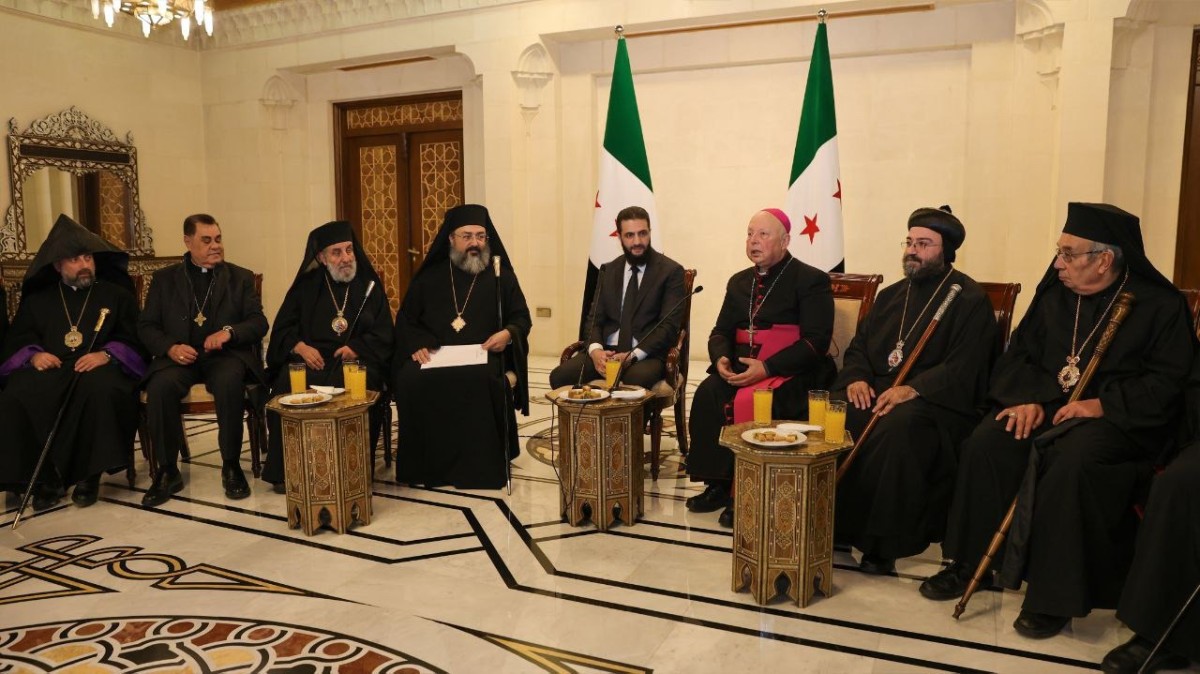Syria.. Al-Sharaa meets a delegation from the "Christian community" on New Year's Eve


The leader of the new administration in Syria, Ahmed Al-Sharaa, met on Tuesday, the eve of New Year's Day, with a delegation from the "Christian community" in the capital, Damascus, according to the Syrian news agency, SANA.
Since the fall of the regime of former President Bashar al-Assad on December 8, at the hands of opposition factions led by Al-Sharaa, minorities, including Christians, have been cautiously monitoring indicators of the new reality in Syria, noting that Al-Sharaa has sent many messages to reassure the minorities.
Al-Sharaa pledged several times to the different sects in Syria that they would be safe. He also told Western officials who visited Syria that the new administration would not seek revenge against the Assad regime, whose senior figures mostly belong to the Alawite sect, and would not suppress any other religious minority, according to What Reuters reported.
In an interview with the American network CNN, Al-Sharaa said that “no one has the right to wipe out another group,” and added that “these sects have coexisted in this region for hundreds of years, and no one has the right to eliminate them.”
Al-Shara also denied, in an interview with the British BBC, his desire to turn Syria into a “copy of Afghanistan,” saying that the two countries are “very different, and each has different traditions.”
Regarding women’s education, Al-Sharaa said that he “believes in women’s education, as we have had universities in Idlib for more than 8 years. I believe that the percentage of women in universities is more than 60%.”
Christmas Mass
Syrian Christians attended Christmas Eve Mass last week for the first time since the ouster of Assad, in a test of pledges by Syria's new leaders to protect the rights of religious minorities in the country.
The mass was held amid tight security measures due to fears of violence targeting Christian sites, and with many light trucks belonging to the new leadership lined up around the church.
Hours before the start of the mass, hundreds of demonstrators gathered in Damascus to denounce the incident of burning a Christmas tree in the northern Hama countryside in west-central Syria.
Most Christians live in the cities of Damascus, Aleppo, Homs, Hama, Latakia and their surrounding areas, or in Al-Hasakah Governorate in the northeastern region of the country.
Most Christians belong to independent Orthodox churches, such as the Syriac Orthodox Church, or to the Eastern Catholic Churches, such as the Maronite Church, or to the Assyrian Church of the East, and other independent Nestorian churches affiliated with it.
The American non-governmental organization Open Doors, which deals with the affairs of Christians around the world, estimates that of the 2.2 million Christians who lived in the country before the war, only approximately 579 thousand remain, or 2.8%, who are still in Syria.
A report from the “The Tablet” organization website revealed that before the war in 2011, there were more than 130,000 Christians residing in northern Syria, a number that has decreased significantly to hundreds or a few thousand people now.
p>